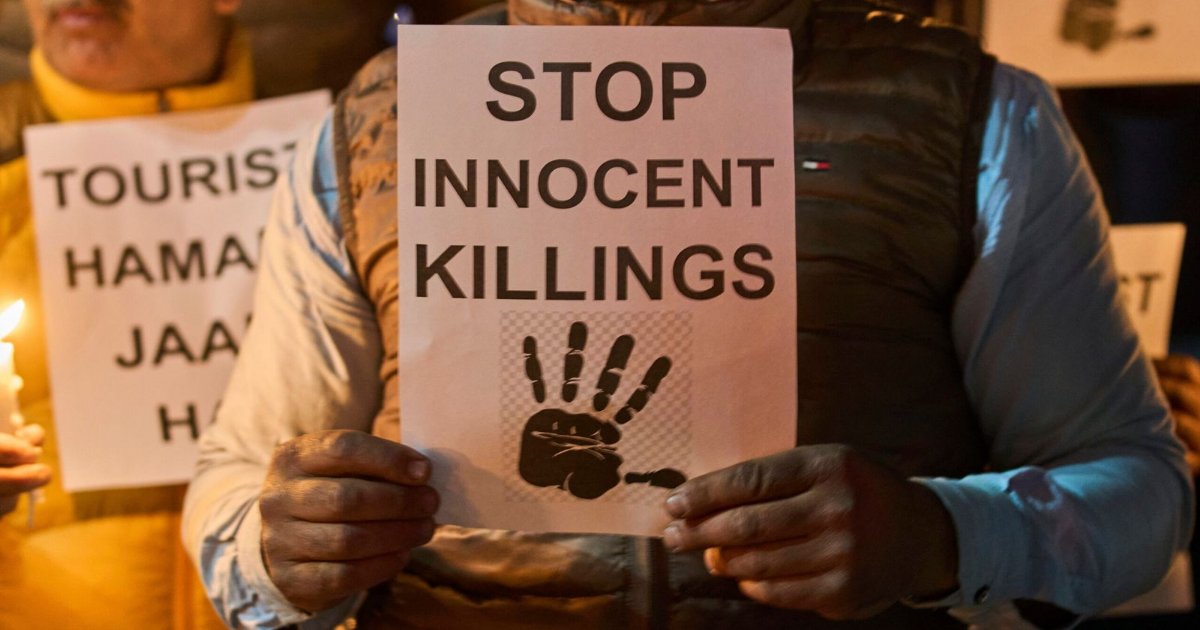It’s a crime scene that could have global consequences.
Two nuclear-armed neighbours with decades of hostility and mistrust are threatening each other again after a militant gun attack in disputed Kashmir.
India and Pakistan have fought several wars and skirmishes since their independence from Britain in 1947.

The latest flashpoint is Tuesday’s murder of tourists who were enjoying holidays in a meadow in Pahalgam, known as mini-Switzerland.
A group of militants opened fire, killing 26 men and injuring dozens more.
India has accused Pakistan of harbouring, arming and sheltering militant organisations whose members infiltrate the almost 500-mile border in Kashmir and attack the state.
Pakistan denies the accusation and says it only supports Kashmiris’ right to self-determination.
Leaders of both countries have turned up the heat, with Indian Prime Minister Narendra Modi telling a rally in the east Indian state of Bihar that his government will “identify, track and punish every terrorist and their backers. We will pursue them to the ends of the earth”.
“Terrorism will not go unpunished. Every effort will be made to ensure that justice is done.”
Please use Chrome browser for a more accessible video player
 1:11
1:11
‘We will track and punish Kashmir terrorists’
New Delhi’s diplomatic response included revoking visas, expelling military advisers, closing a border crossing and suspending the Indus Water Treaty.
Pakistan Prime Minister Shehbaz Sharif reacted at a meeting on Thursday of the country’s national security committee, passing reciprocal measures and warning that the suspension of the treaty would be considered an act of war.

Image: Kashmiris condemn the Pahalgam attack during a protest in Srinagar in Indian-controlled Kashmir. Pic: AP
‘Unacceptable at any cost’
Pakistan’s foreign minister Ishaq Dar said “any such unilateral action is unacceptable at any cost”.
In 2019, a suicide bomber in a vehicle killed 40 paramilitary soldiers in a military convoy.

Image: Supporters of the Pakistan Murkazi Muslim League party protest against the suspension of the Indus Water Treaty. Pic: AP
India blamed Pakistan for giving shelter to Islamist terrorists and conducted limited airstrikes across the border. A tense stand-off between the two nuclear-armed neighbours has lasted since.
Later that year, Mr Modi’s government suspended the special status of Jammu and Kashmir, the only Muslim majority state in India and brought it directly under the control of New Delhi.
The Kargil War in May 1999 led to a stand-off often described as a nuclear flashpoint.
Pakistan’s military covertly occupied Indian posts across the line of control (LoC). After the war began, Pakistan asked US President Bill Clinton to help de-escalate the conflict.

Image: The Indian military has been searching for the attackers
The result was the Washington Accord, under which Prime Minister Nawaz Sharif agreed to withdraw Pakistani troops and restore the LoC.
But the United Jihad Council, an umbrella organisation of extremist groups, rejected the deal and decided to continue fighting the Indian state.
2008 Mumbai terror attack left 166 dead
The 2008 Mumbai terror attack was evidence of this, when 166 people were killed by 10 terrorists belonging to Lashkar-e-Taiba (LeT), a group alleged to have close ties to Pakistan’s spy agency, the Inter-Service Intelligence (ISI).
The killings went on for four days at iconic places across the city. The only gunman who was caught, Ajmal Kasab, said the attackers were members of the terror group before he was executed in 2012.
For decades, Kashmir has been caught up in the vortex of violence, conflict, killings and kidnappings.
Pakistan says Kashmir remains an unresolved dispute, and they will continue to support the right of self-determination of its people.
Read more:
Pakistan warns of ‘all-out war’
India and Pakistan tensions rise

Image: Protests in Ahmedabad against the Pahalgam attack. Pic: AP
Pakistan’s ‘jugular vein’
Last week, the all-powerful Pakistan army chief General Asim Munir said Kashmir was their “jugular vein” and Islamabad “will not leave our Kashmiri brothers in their heroic struggle”.
Kashmir is the crown over which the two nuclear-armed neighbours have fought wars and are in a perpetual state of tension.
The mistrust between the two countries has grown over the years, and there is little diplomatic manoeuvring to bridge that gap.
And, after the Pahalgaum attack, there is every chance of an escalation that could be devastating to its people.
